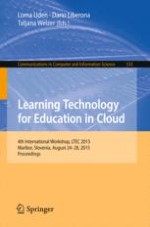
2015 | OriginalPaper | Chapter
Engagement Measures in Massive Open Online Courses
Authors : Jane Sinclair, Sara Kalvala
Published in: Learning Technology for Education in Cloud
Publisher: Springer International Publishing
Activate our intelligent search to find suitable subject content or patents.
Select sections of text to find matching patents with Artificial Intelligence. powered by
Select sections of text to find additional relevant content using AI-assisted search. powered by